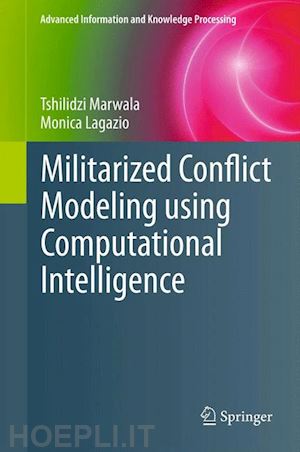
Questo prodotto usufruisce delle SPEDIZIONI GRATIS
selezionando l'opzione Corriere Veloce in fase di ordine.
Pagabile anche con Carta della cultura giovani e del merito, 18App Bonus Cultura e Carta del Docente
Militarized Conflict Modeling Using Computational Intelligence examines the application of computational intelligence methods to model conflict. Traditionally, conflict has been modeled using game theory. The inherent limitation of game theory when dealing with more than three players in a game is the main motivation for the application of computational intelligence in modeling conflict.
Militarized interstate disputes (MIDs) are defined as a set of interactions between, or among, states that can result in the display, threat or actual use of military force in an explicit way. These interactions can result in either peace or conflict. This book models the relationship between key variables and the risk of conflict between two countries. The variables include Allies which measures the presence or absence of military alliance, Contiguity which measures whether the countries share a common boundary or not and Major Power which measures whether either or both states are a major power.
Militarized Conflict Modeling Using Computational Intelligence implements various multi-layer perception neural networks, Bayesian networks, support vector machines, neuro-fuzzy models, rough sets models, neuro-rough sets models and optimized rough sets models to create models that estimate the risk of conflict given the variables. Secondly, these models are used to study the sensitivity of each variable to conflict. Furthermore, a framework on how these models can be used to control the possibility of peace is proposed. Finally, new and emerging topics on modelling conflict are identified and further work is proposed.
Modelling Conflicts between States: New Development for an Old Problem.-Automatic Relevance Determination for Identifying Interstate Conflict.-Multi-Layer Perception and Radial Basis Function for Modeling Interstate Conflict.-Bayesian Approaches to Modeling Interstate Conflict.-Support Vector Machines for Modeling Interstate Conflict.-Fuzzy Sets for Modeling Interstate Conflict.-Rough Sets for Modeling Interstate Conflict.-Particle Swarm Optimization and Hill-Climbing Optimized Rough Sets for Modeling Interstate Conflict.-Simulated Annealing Optimized Rough Sets for Modeling Interstate Conflict.-Genetic Algorithm with Optimized Rough Sets for Modeling Interstate Conflict.-Neuro-Rough Sets for Modeling Interstate Conflict.-Early Warning and Conflict Prevention Using Computational Techniques.-Conclusions and Emerging Topics.











Il sito utilizza cookie ed altri strumenti di tracciamento che raccolgono informazioni dal dispositivo dell’utente. Oltre ai cookie tecnici ed analitici aggregati, strettamente necessari per il funzionamento di questo sito web, previo consenso dell’utente possono essere installati cookie di profilazione e marketing e cookie dei social media. Cliccando su “Accetto tutti i cookie” saranno attivate tutte le categorie di cookie. Per accettare solo deterninate categorie di cookie, cliccare invece su “Impostazioni cookie”. Chiudendo il banner o continuando a navigare saranno installati solo cookie tecnici. Per maggiori dettagli, consultare la Cookie Policy.